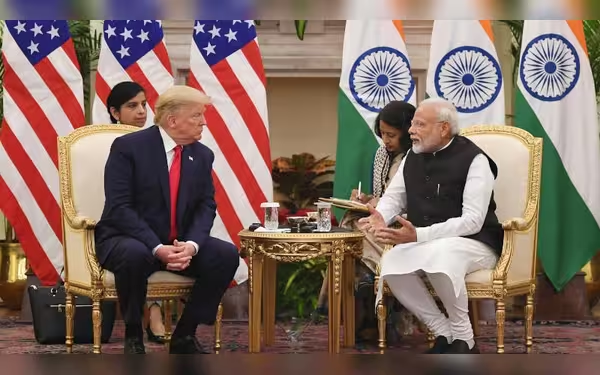Saturday, November 16, 2024 08:41 PM
Trump And Modi: A Comparative Analysis Of Electoral Strategies
- Trump and Modi resonate with grassroots sentiments.
- Hindutva ideology crucial for Modi's electoral success.
- Populism drives political victories for both leaders.
 Image Credits: menafn
Image Credits: menafnExplore the similarities in electoral strategies of Trump and Modi, highlighting grassroots support and the impact of populism.
The recent electoral victories of Donald Trump in the United States and Narendra Modi in India reveal striking similarities in their political strategies and the socio-political landscapes they navigated. Both leaders emerged victorious against opponents who failed to resonate with the grassroots sentiments of their respective electorates. Trump's win over Kamala Harris in the November 5 US Presidential election mirrors Modi's sweeping triumphs in the 2014 and 2019 Indian parliamentary elections.
In the United States, the Democratic Party's earlier candidate, Joe Biden, was perceived as too old and frail to connect with voters. His replacement, Kamala Harris, while younger and more dynamic, struggled to articulate a clear vision for addressing pressing issues such as unemployment and illegal immigration. Instead, her campaign focused on combating Trump's authoritarian tendencies, a concern that resonated primarily with a small segment of the elite rather than the average American. The common man, regardless of race, was more concerned with tangible issues affecting their daily lives.
Similarly, in India, Modi emerged as a beacon of hope in 2014, offering a stark contrast to the Congress party, which had been in power for a decade. The Congress party, led by Sonia Gandhi and her son Rahul Gandhi, was seen as out of touch with the aspirations of the Indian populace. Rahul Gandhi's perceived lack of charisma and seriousness further alienated voters, paving the way for Modi's rise. His promise of economic growth and development appealed to many, even though the benefits of this growth did not reach all segments of society.
Modi's ability to galvanize support among the majority Hindu population through his Hindutva ideology played a crucial role in his electoral success. This ideology emphasized Hindu identity and power, allowing him to carve out a significant social constituency. In contrast, the Congress party's traditional support base, which included Muslims and lower castes, had diminished over time, making Modi's victory in 2014 unsurprising.
In 2019, despite facing declining popularity, Modi capitalized on a terror attack in Kashmir to rally support, showcasing his decisive leadership through military action. This strategic move solidified his position and led to another significant electoral win. Even as Modi faced challenges in the upcoming 2024 elections, his Hindutva ideology remained resilient against Rahul Gandhi's attempts to position himself as a defender of the liberal Indian constitution.
On the other side of the globe, Trump's campaign thrived on the discontent of voters dissatisfied with the Biden administration's performance. His ability to tap into cultural divisions and tribal politics allowed him to expand his support base beyond the traditional demographics. Despite his controversial immigration policies, Trump garnered support from Latino voters, illustrating the complexities of American identity and politics.
Trump's brashness and willingness to challenge political norms resonated with many, particularly young men disillusioned with the current state of the economy. His strategic choice of running mate, Ohio Senator J.D. Vance, helped counter concerns about his age and appeal to female voters by shifting the abortion debate to state-level decisions.
As the electoral landscape continues to evolve, the parallels between Trump and Modi serve as a reminder of the power of populism and the importance of connecting with the electorate's core concerns. Both leaders have demonstrated that understanding and addressing the needs of the common people can lead to significant political victories, even in the face of formidable challenges. As we look ahead, it will be crucial for future leaders to learn from these examples and strive to create inclusive policies that resonate with all segments of society.













